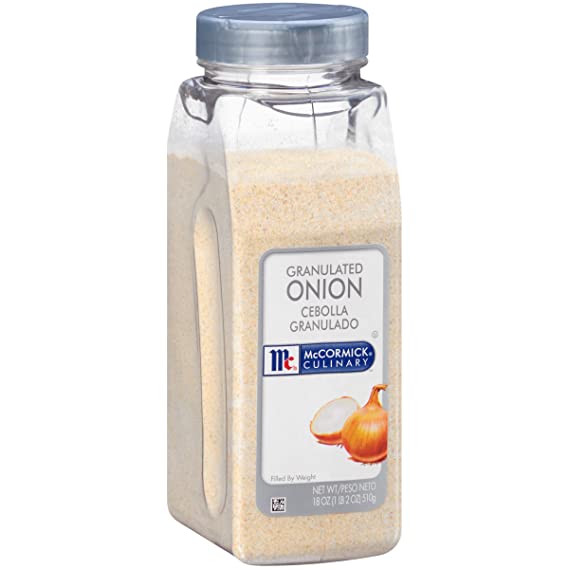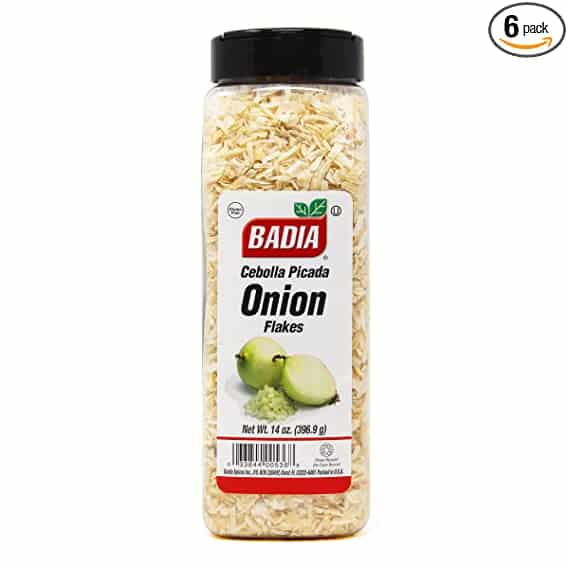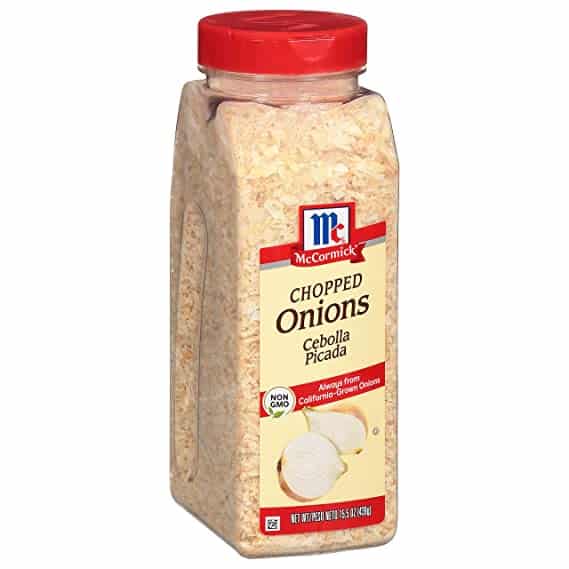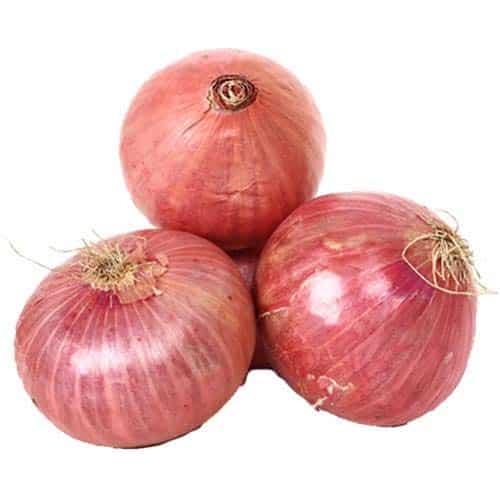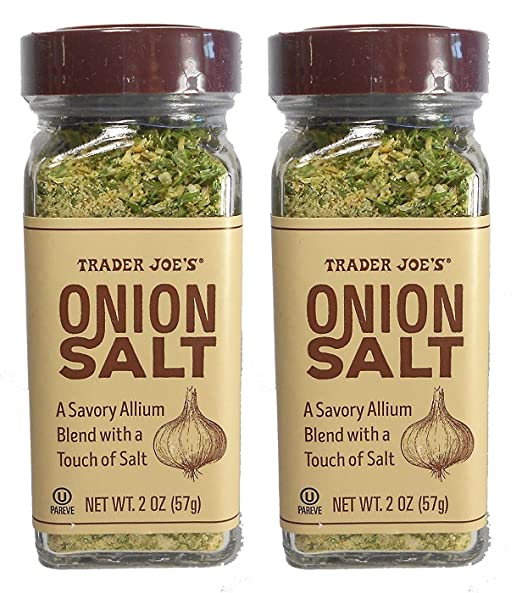Onion powder is a typical seasoning and flavoring compound found in most spice cabinets and kitchens throughout the United States. It’s utilized in various cuisines to give savory meals a richer flavor.
So, what do you do when you’re completely exhausted and need to get cooking?
In a rush, here are a few easy alternatives to replace onion powder!
When it comes to onion powder, granulated onion is the easiest and most cost-effective substitute. Its taste is milder and similar to the texture of minced onion, and the ratio of granules to onion powder is almost one-to-one. There are a few other ways to replace the flavor of onion powder, including dried onion flakes, chopped celery, or onion salt.
What is onion powder?
Onion powder is a flavoring powder made entirely of dried onions that have been powdered.
While toasted variants of yellow and red onion powder are available, most onion powder is dried white onions compacted to powder and packaged as a spice.
Before dehydration, onions for powder production are minced to the same consistency to provide a uniform color and flavor.
Top substitutes of onion powder
The dehydrated onion that has been finely processed into a powder is used to make onion powder. It’s commonly used as a backup to more prominent flavors in a meal, but it’s still noticeable if left out. It’s also an excellent substitute for individuals who dislike raw onions (like me!).
Here are some typical replacements that you may already have on hand or easily find in stores.
1. Granulated Onion
Onion powder and granulated onion are extremely similar. The sole distinction is that granulated onion is coarser pulverized than onion flakes or minced onion but still finer. Simply twice the quantity to substitute!
2. Onion Flakes
Onion flakes work well in place of onion powder, and these flakes are nothing more than dehydrated onion that hasn’t been powdered. You may leave the flakes whole or ground them into a 1:1 replacement with a mortar and pestle.
If you want to keep it whole, use around 1 tablespoon of onion powder for 1 teaspoon of onion powder (see the conversions later in this post).
3. Jarred Chopped Onion
Another component that is comparable to onion flakes is jarred chopped onion. The dried onion that has been finely ground but is still coarser than powder is known as minced onion.
You can substitute 1 tablespoon canned chopped onion for 1 teaspoon onion powder, but you’ll want to use less than you would for onion flakes if you’re making larger batches.
4. Fresh Onion
Because onion powder has a much stronger flavor than raw onion, you’ll need a lot more of it to make a good alternative.
3 tablespoons fresh sliced onion = 1 teaspoon onion powder. Because fresh onions have a high water content, you’ll need to modify the other liquids in your dish as needed.
5. Onion Salt
Onion salt is a condiment that is similar to garlic salt. It’s exactly what it says on the tin: onion powder or granulated onion mixed with salt.
To keep the flavors balanced, use it as a 1:1 substitute while reducing other salty aspects in the recipe.
One onion equals how much onion powder?
Here are some simple equivalents to keep in mind (that I tweaked slightly):
1 teaspoon onion powder or 1 tablespoon dried onion flakes = 1/3 cup chopped small onion
1 tablespoon onion powder or 1/4 cup dried onion flakes = 1 medium chopped onion (1 cup)
12 teaspoons onion powder or 5 tablespoons dry onion flakes = 112 cups minced onion
Is it possible to substitute onion powder for onion flakes?
Similarly, you can use onion powder instead of flakes, but it won’t have the same texture. If you don’t want to give up this convenience, you can produce your own onion flakes by thinly slicing one onion and baking it on a parchment-lined baking pan. You won’t have to dry the onion flakes for as long if you’re drying them for immediate use, and you might even be able to use a higher heat!
Onions are meant to be preserved, so they must be dried for a long time at a low temperature. This won’t be an issue if you’re just drying them for texture.
Onion granules vs. Onion powder: Which is better?
Whether you should use onion granules or onion powder depends on your intention to use onion’s taste and texture. Onion powder is the ideal choice for a burst of robust flavor.
It’s also what you’ll be sprinkling on meals as spice before eating it. Onion granules must be cooked and are too coarse for most people to consume raw.
Certain recipes are better suited to each ingredient’s intensity and consistency. We hope our comparison aids you in making the greatest dining decision possible.
Onion Powder: A Step-by-Step Guide
With fresh onions and a dehydrator, you can manufacture your own onion powder, which tastes delicious and is easy to use.
To remove dirt from your onions, wash them.
Remove the onion’s roots and peel the outer skin.
Thinly slice the onions to a thickness of 14 to 18 inches.
Place your onion slices on dehydrator trays with room to ensure optimal ventilation.
Dehydrate the onions for 12 hours to several days at 100-110 degrees Fahrenheit. Cook in a standard oven at 140 degrees Fahrenheit until crisp, which takes a few hours.
Make sure the onions are completely dry; they should snap in half rather than bend. Continue to dehydrate them if they don’t snap.
To keep your onion powder, grind it and store it in an airtight container.
What are some general usage of onion powder?
Any recipe that calls for fresh onion can be made with onion powder. A half-cup of chopped fresh onion equals one tablespoon of onion powder, and it’s simple! Stir in the onion powder to coat the surface of the dish.
Onion powder is a great addition to soups and stews. Pure onion powder adds a bold onion taste and scent to everything from vegetable, meat, and bean soups to any type of chili or beef stew, gumbo, and chowder.
Onion powder is a must-have flavor for burgers, meatloaf, chili, skillet suppers, etc. We like to use a teaspoon per pound of ground beef, but you may play around with it!
Onion powder is a natural fit for dry rubs. Onion powder, garlic powder, cumin, thyme leaves, parsley flakes, red pepper, or cayenne pepper are used to season pork ribs. Allow the ribs to soak in the flavor before roasting or grilling them for about an hour.
Does onion powder go bad?
Onion powder is a crushed onion that has been dehydrated and can be created from red, white, or yellow onions. The powder contains salt and spice mixtures, making it an excellent flavoring.
Is it possible for onion powder to spoil? Onion powder does, in fact, expire. It’s not like garlic powder, which may be stored indefinitely if properly secured. If kept in an airtight container and protected from moisture and sunlight, onion powder will last 3 to 4 years. If you manufacture fresh onion powder at home, it must be kept in the refrigerator. The shelf life of homemade onion powder is only 6 to 8 months.
Bugs inside the powder, moisture damage, a darker hue, and a lack of scent and flavor are all indicators that the powder has gone bad.
What is the shelf life of onion powder?
You’ll appreciate that onion powder has a long shelf life if you enjoy onions. The onion powder can easily last 3 to 4 years if stored in an airtight container. Even in its sixth year, onion powder can be consumed.
So, if you’re putting up a long-term food preservation pack, onion powder is ideal, and it lasts far longer than whole onions and is far superior to onion oil in terms of flavor.
What is the shelf life of homemade onion powder?
The intensity of all freshly created onion powder is twice that of manufactured onion powder, and it does not have the same shelf life as the original. However, it will last long enough to warrant all of your hard work and onion powdering.
Homemade onion powder will last 6 to 8 months or even a year in an airtight container. However, you might not have to keep it for that long. Because powdering a single onion produces a small amount of onion powder, it will be gone by the end of the month if you cook frequently.
How to keep onion powder safe?
Garlic powder and onion powder can both be stored in the same way. It’s best to keep it in a plastic or glass container in a cupboard or pantry where it won’t be exposed to extreme temperatures. It should also be kept out of direct sunlight. The sun has a tendency to bleach and destroy whatever it shines on. If onion powder is stored in direct sunlight, it will deteriorate.
Place the onion powder in a small Ziplock bag if it comes in a small baggie with no seal to keep the air out. If you leave the onion powder in the tiny bag with the huge hole open, it will be exposed to the air and the many bugs that will want to climb inside and lay their eggs.
Alternatively, you can store the onion powder in the bag in the refrigerator. You can also cover the hole with tape to store the onion powder bag with the rest of the spices in the cupboard.
It’s fantastic to make your own onion powder because the flavor is twice as intense. However, you must store it properly because it does not keep as long as a powder from the supermarket. Homemade onion powder, unlike store-bought onion powder, must be kept refrigerated. If there isn’t enough room in the refrigerator, it can be placed somewhere colder than the remainder of the kitchen. The handmade onion powder will not cake in cold temperatures.
If you have too much onion powder, you can freeze it, whether store-bought or homemade.
What causes onion powder to consolidate?
The absorption of moisture is the most common cause of onion powder hardening. As previously stated, onion powders are dehydrated, which removes over 96 percent of the water. As a result, it hardens when the powder absorbs moisture or water.
We have a tendency to shake the container over the hot pot when adding seasonings to a dish. As a result, water vapor from the pot enters the container, clumping the powder.
Another factor that contributes to onion powder hardening is the humidity level in your area. If you reside in a humid area, putting your spices outside at room temperature increases the likelihood of their hardening.
Some onion powder brands harden more quickly than others, and some brands can clump quickly and frequently due to extra added ingredients and different expiration dates.
What are the options for resolving the hardness issue of onion powder?
So, now that you have a container full of hard onion powder, you’re probably thinking if it’s feasible to loosen or soften it. Fortunately, it is! We’ve compiled three options for you to consider. Choose the one that is most convenient for you.
Use a blender or a food processor to make the sauce.
If the powder is thick, break it up with your fingers into small enough bits to fit in your blender or food processor, then pulse until it becomes powder again. If the mixture is less lumpy, a funnel can be used to keep it from flying around the room.
The powder should be strained.
You can use a microblade or even a strainer to break up the lumps in your powder. To make the straining procedure easier, start by breaking apart large solid clumps with a spoon. Then gently rub the lump on the strainer mesh with a spoon. Keep the powder in a dry, airtight container.
Conclusion
Onion powder is a widely used spice around the world. Onions are used in almost all civilizations and cuisines throughout the world. Onion powder, unlike garlic powder, has a shelf life. A tiny bag of garlic powder should never be left unattended. Tape the hole shut, put it in a Ziplock bag, or store it in the refrigerator. If purchased from a food store, onion powder can last two to three years. Onion powder should be kept in an airtight jar with your other spices.
